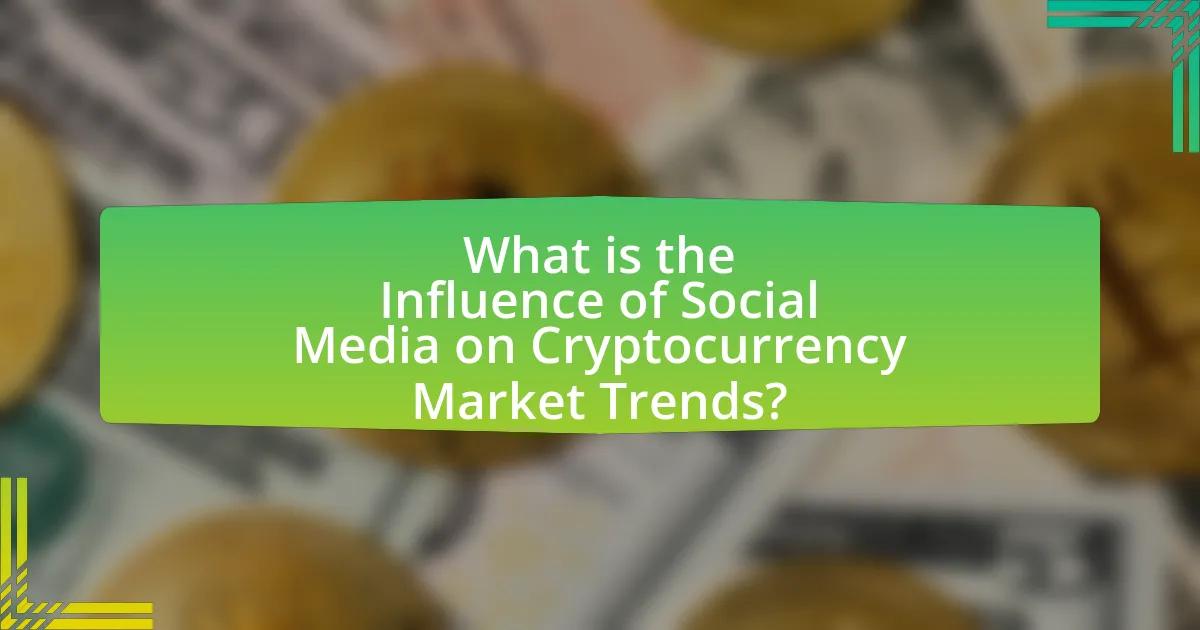The article examines the significant influence of social media on cryptocurrency market trends, highlighting how platforms like Twitter and Reddit shape public perception and trading behavior. It discusses the correlation between social media activity and price fluctuations, emphasizing the role of influential figures in driving market sentiment. The piece also explores the impact of misinformation, the importance of community engagement for cryptocurrency projects, and strategies for investors to navigate social media trends effectively. Additionally, it addresses emerging trends and potential regulatory changes that could affect the dynamics between social media and cryptocurrency markets.

What is the Influence of Social Media on Cryptocurrency Market Trends?
Social media significantly influences cryptocurrency market trends by shaping public perception and driving trading behavior. Platforms like Twitter and Reddit serve as primary channels for information dissemination, where news, rumors, and opinions can rapidly affect market sentiment. For instance, a study by the University of Technology Sydney found that tweets from influential figures can lead to immediate price fluctuations in cryptocurrencies, with a 1% increase in tweet volume correlating with a 0.5% price change. Additionally, social media trends can create herd behavior among investors, leading to increased volatility and speculative trading. This dynamic illustrates how social media acts as both a catalyst for market movements and a reflection of investor sentiment in the cryptocurrency space.
How does social media impact cryptocurrency prices?
Social media significantly impacts cryptocurrency prices by influencing investor sentiment and market trends. Platforms like Twitter and Reddit serve as primary channels for information dissemination, where news, rumors, and discussions can rapidly affect public perception and trading behavior. For instance, a study published in the Journal of Corporate Finance found that tweets from influential figures can lead to immediate price fluctuations, with Bitcoin’s price increasing by an average of 1.5% following positive tweets. Additionally, social media trends can create FOMO (fear of missing out), driving speculative trading and volatility in cryptocurrency markets.
What role do social media platforms play in price fluctuations?
Social media platforms significantly influence price fluctuations in the cryptocurrency market by facilitating rapid information dissemination and shaping public sentiment. For instance, tweets from influential figures like Elon Musk have been shown to cause immediate price changes; a single tweet can lead to a price increase or decrease of several percentage points within minutes. Research conducted by the University of Technology Sydney found that social media sentiment correlates with cryptocurrency price movements, indicating that positive or negative posts can directly impact market behavior. This demonstrates that social media acts as a catalyst for price volatility, amplifying reactions to news and trends in real-time.
How do social media trends correlate with market movements?
Social media trends significantly correlate with market movements, particularly in the cryptocurrency sector. Research indicates that spikes in social media activity, such as increased mentions or hashtags related to specific cryptocurrencies, often precede price fluctuations. For instance, a study by Liu and Serfaty (2020) published in the Journal of Financial Markets found that a 10% increase in social media mentions of Bitcoin was associated with a 1.5% increase in its price within a week. This demonstrates that social media serves as a real-time sentiment indicator, influencing investor behavior and market dynamics.
Why is social media engagement important for cryptocurrency projects?
Social media engagement is crucial for cryptocurrency projects because it fosters community building and enhances visibility. Engaged communities on platforms like Twitter and Reddit can drive interest and investment, as evidenced by the rapid price movements of cryptocurrencies often correlated with social media activity. For instance, a study by the University of Technology Sydney found that social media sentiment significantly influences cryptocurrency prices, highlighting the direct impact of engagement on market trends.
What metrics indicate social media engagement in the crypto space?
Metrics that indicate social media engagement in the crypto space include likes, shares, comments, follower growth, and sentiment analysis. These metrics provide insights into how users interact with cryptocurrency-related content. For instance, a high number of likes and shares suggests that the content resonates with the audience, while comments can indicate the level of discussion and interest. Follower growth reflects the expanding reach of a cryptocurrency project or influencer, and sentiment analysis gauges the overall perception of the crypto market based on user-generated content. Collectively, these metrics help assess the effectiveness of social media strategies in influencing cryptocurrency market trends.
How does engagement affect investor sentiment?
Engagement significantly influences investor sentiment by shaping perceptions and emotional responses toward investments. High levels of engagement, such as likes, shares, and comments on social media platforms, can create a sense of community and validation among investors, leading to increased confidence in their investment decisions. For instance, a study by the University of Technology Sydney found that social media engagement correlates with positive sentiment, which can drive market trends in cryptocurrencies. This correlation indicates that when investors actively participate in discussions and share information, it can enhance their overall sentiment, potentially leading to increased buying activity and market volatility.
What are the key social media platforms influencing cryptocurrency trends?
The key social media platforms influencing cryptocurrency trends are Twitter, Reddit, and Telegram. Twitter serves as a primary source for real-time updates and discussions among cryptocurrency enthusiasts, with hashtags like #Bitcoin and #Crypto driving engagement and information dissemination. Reddit hosts numerous communities, such as r/CryptoCurrency, where users share insights, news, and analysis, significantly impacting market sentiment. Telegram is widely used for direct communication among traders and project teams, facilitating the sharing of information and updates in dedicated channels. These platforms collectively shape public perception and trading behavior in the cryptocurrency market.
Which platforms are most popular among cryptocurrency investors?
The most popular platforms among cryptocurrency investors are Binance, Coinbase, and Kraken. Binance leads the market with the highest trading volume, offering a wide range of cryptocurrencies and advanced trading features. Coinbase is favored for its user-friendly interface and regulatory compliance, making it accessible for beginners. Kraken is known for its security measures and a diverse selection of cryptocurrencies. According to data from CoinMarketCap, Binance consistently ranks as the largest exchange by trading volume, while Coinbase has over 89 million verified users, highlighting its popularity among retail investors.
How do different platforms cater to various cryptocurrency audiences?
Different platforms cater to various cryptocurrency audiences by tailoring their features and content to meet the specific needs and preferences of distinct user groups. For example, platforms like Twitter and Reddit focus on real-time discussions and community engagement, attracting younger, tech-savvy audiences who prefer fast-paced information sharing. In contrast, LinkedIn targets professionals and institutional investors by providing in-depth articles and networking opportunities, appealing to those seeking detailed analysis and business insights. Additionally, platforms such as Telegram and Discord facilitate direct communication and community building, which resonates with niche groups and enthusiasts looking for interactive experiences. This segmentation is supported by data indicating that 70% of cryptocurrency discussions occur on social media, highlighting the platforms’ roles in shaping audience engagement and market trends.
How does misinformation on social media affect cryptocurrency markets?
Misinformation on social media significantly impacts cryptocurrency markets by causing price volatility and influencing investor behavior. For instance, false news about regulatory changes or technological advancements can lead to rapid buying or selling, resulting in sharp price fluctuations. A study by the University of Technology Sydney found that tweets containing misleading information about Bitcoin correlated with a 10% price change within hours. This demonstrates that misinformation can create panic or euphoria among investors, leading to irrational market movements.
What are common types of misinformation in the cryptocurrency space?
Common types of misinformation in the cryptocurrency space include false claims about project legitimacy, misleading price predictions, and fabricated news about regulatory changes. False claims often arise from social media influencers promoting scams or unverified projects, leading to significant financial losses for investors. Misleading price predictions can create artificial market movements, as seen when influencers exaggerate potential gains without basis in reality. Additionally, fabricated news regarding regulatory changes can cause panic selling or irrational buying, impacting market stability. These forms of misinformation are prevalent due to the decentralized nature of cryptocurrency and the rapid dissemination of information through social media platforms.
How can misinformation lead to market volatility?
Misinformation can lead to market volatility by causing rapid and irrational changes in investor behavior. When false information spreads, it can trigger panic selling or speculative buying, resulting in significant price fluctuations. For instance, a study by the University of California, Berkeley, found that misleading tweets about cryptocurrency can lead to price drops of over 10% within hours, demonstrating how quickly misinformation can impact market dynamics. This volatility is exacerbated in the cryptocurrency market, where trading volumes are often driven by social media sentiment rather than fundamental analysis.
What strategies can cryptocurrency projects use to leverage social media?
Cryptocurrency projects can leverage social media by implementing targeted marketing campaigns, engaging with their community, and utilizing influencers. Targeted marketing campaigns allow projects to reach specific demographics, increasing visibility and attracting potential investors. Engaging with the community through regular updates, Q&A sessions, and feedback solicitation fosters trust and loyalty among users. Utilizing influencers can amplify reach, as endorsements from trusted figures can significantly impact public perception and interest. According to a study by the Cambridge Centre for Alternative Finance, social media engagement is correlated with increased trading volumes and market interest in cryptocurrencies, demonstrating the effectiveness of these strategies.
How can effective communication enhance a project’s reputation?
Effective communication enhances a project’s reputation by fostering transparency and trust among stakeholders. When a project clearly articulates its goals, progress, and challenges, it builds credibility, which is essential in the cryptocurrency market where skepticism can be high. For instance, projects that regularly update their community through social media channels tend to experience increased engagement and positive sentiment, as evidenced by a study from the Journal of Business Research, which found that transparent communication significantly correlates with stakeholder trust and project success. This trust can lead to greater investment and support, ultimately enhancing the project’s overall reputation in a competitive landscape.
What role does community building play in a project’s success?
Community building is crucial for a project’s success as it fosters engagement, loyalty, and advocacy among users. A strong community enhances communication, allowing for feedback and collaboration, which can lead to improved project development and innovation. For instance, projects like Ethereum and Bitcoin have thrived due to their active communities that contribute to discussions, share knowledge, and promote the project on social media platforms. Research indicates that projects with robust community support often experience higher market valuations and sustained interest, as seen in the rise of decentralized finance (DeFi) platforms that leverage community-driven initiatives to attract users and investors.
How can investors navigate social media trends in cryptocurrency?
Investors can navigate social media trends in cryptocurrency by employing a systematic approach to analyze sentiment and engagement metrics. Utilizing tools like social media analytics platforms allows investors to track discussions, identify influential voices, and gauge public sentiment towards specific cryptocurrencies. For instance, a study by the University of Technology Sydney found that social media sentiment significantly correlates with cryptocurrency price movements, indicating that positive sentiment can lead to price increases. By monitoring platforms such as Twitter and Reddit, investors can make informed decisions based on real-time trends and community sentiment, thereby enhancing their investment strategies.
What tools can investors use to track social media sentiment?
Investors can use tools like Brandwatch, Hootsuite, and Sentiment Analysis APIs to track social media sentiment. Brandwatch provides comprehensive analytics on social media conversations, allowing investors to gauge public sentiment around cryptocurrencies. Hootsuite offers social listening features that enable users to monitor brand mentions and sentiment across various platforms. Sentiment Analysis APIs, such as those from Google Cloud or IBM Watson, analyze text data from social media to determine positive, negative, or neutral sentiments, providing investors with actionable insights. These tools are essential for understanding market trends influenced by social media discussions.
How can investors differentiate between hype and genuine trends?
Investors can differentiate between hype and genuine trends by analyzing market data, social media sentiment, and fundamental indicators. Market data, such as trading volume and price movements, can reveal whether a trend is supported by substantial investor interest or merely driven by speculation. For instance, a significant increase in trading volume alongside a price rise often indicates a genuine trend, while a spike in price with low volume may suggest hype.
Social media sentiment analysis can also provide insights; tools that measure the frequency and positivity of mentions can help investors gauge public interest and sentiment towards a cryptocurrency. Research from the Journal of Financial Economics indicates that social media activity can predict stock price movements, suggesting similar dynamics may apply to cryptocurrencies.
Finally, examining fundamental indicators, such as the technology behind a cryptocurrency, its use case, and the team involved, can help investors assess the long-term viability of a trend versus short-lived hype. For example, cryptocurrencies with strong technological foundations and real-world applications tend to sustain their value better than those driven solely by social media buzz.
What best practices should cryptocurrency projects follow on social media?
Cryptocurrency projects should prioritize transparency, engagement, and consistent branding on social media. Transparency involves openly sharing project updates, financial information, and addressing community concerns, which builds trust and credibility. Engagement is crucial; projects should actively interact with their audience through Q&A sessions, polls, and responding to comments, fostering a sense of community. Consistent branding across platforms ensures that the project’s identity is recognizable, which can enhance user loyalty and attract new followers. According to a study by the Cambridge Centre for Alternative Finance, effective social media strategies can significantly influence market perception and investor behavior, highlighting the importance of these best practices.
How can transparency improve trust among investors?
Transparency can improve trust among investors by providing clear and accessible information about financial activities and decision-making processes. When investors have access to accurate data regarding a company’s operations, financial health, and governance, they are more likely to feel confident in their investment choices. For instance, a study by the CFA Institute found that 70% of investors consider transparency in financial reporting as a key factor in their trust towards a company. This level of openness reduces uncertainty and mitigates the risk of fraud, thereby fostering a more trustworthy investment environment.
What are effective content strategies for engaging audiences?
Effective content strategies for engaging audiences include utilizing storytelling, leveraging user-generated content, and optimizing for social media platforms. Storytelling captivates audiences by creating emotional connections, which can increase engagement rates; for instance, brands that tell compelling stories see a 22% increase in engagement. User-generated content fosters community and trust, as 79% of consumers say user-generated content highly impacts their purchasing decisions. Additionally, optimizing content for social media platforms ensures that it reaches the target audience effectively, with 73% of marketers believing that social media marketing has been effective for their business. These strategies collectively enhance audience engagement and drive interaction.
How can social media influence the future of cryptocurrency markets?
Social media can significantly influence the future of cryptocurrency markets by shaping public perception and driving market sentiment. Platforms like Twitter and Reddit have already demonstrated their power in rapidly disseminating information, which can lead to price volatility; for instance, the Dogecoin surge in 2021 was largely fueled by social media discussions and endorsements from high-profile figures. Additionally, social media can facilitate community engagement and grassroots movements, as seen with the rise of decentralized finance (DeFi) projects that gain traction through viral marketing. The ability of social media to create trends and influence investor behavior suggests that its role in cryptocurrency markets will continue to grow, potentially leading to more pronounced market fluctuations based on social sentiment and trends.
What emerging trends in social media could impact cryptocurrency?
Emerging trends in social media that could impact cryptocurrency include the rise of decentralized finance (DeFi) discussions, influencer marketing, and the integration of non-fungible tokens (NFTs) into social platforms. DeFi discussions on platforms like Twitter and Reddit have increased awareness and engagement, leading to greater investment in cryptocurrencies. Influencer marketing, where prominent figures promote specific cryptocurrencies, can significantly sway public interest and investment patterns, as seen with endorsements from celebrities. Additionally, the integration of NFTs into social media platforms, such as Instagram’s support for NFT displays, creates new avenues for cryptocurrency transactions and user engagement, further driving market dynamics.
How might regulatory changes affect social media’s role in cryptocurrency?
Regulatory changes can significantly alter social media’s role in cryptocurrency by imposing stricter guidelines on advertising and information dissemination. For instance, regulations may limit the types of cryptocurrency promotions allowed on platforms, thereby reducing the volume of user-generated content that can influence market trends. In 2018, Facebook banned cryptocurrency ads, which led to a notable decline in the visibility of certain projects, demonstrating how regulatory actions can directly impact social media engagement with cryptocurrencies. Additionally, increased scrutiny on misinformation could lead platforms to implement more rigorous fact-checking processes, further shaping the narratives around cryptocurrencies shared online.






